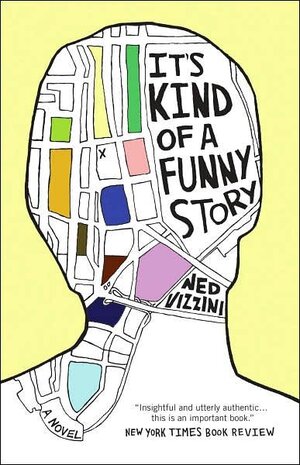According to him, "you wouldn't see me in the halls at school and go "There he goes, Craig Gilner - I wonder what he's up to."" He's just a regular guy, gets decent grades, got into a good high school and can't quite handle the stress, has a crush on his best friend's girlfriend, and, oh yeah, his depression is so bad he can't eat, ever, and one night he walks into a hospital and tells them he wants to kill himself, and ends up in an adult psychiatric ward surrounded by a fascinating cast of characters that are simultaneously very funny and very sad.
It's Kind of a Funny Story is a novel, but it's based on the author's actual experiences of hospitalization for suicidal ideation. "It's 85% true," he said in an interview.
And the title is perfect, because it really shouldn't be funny. But it is. When Craig calls a suicide hotline, the operator isn't helpful: "For someone in Anxiety Management, he's giving me an exercise that is fairly confusing and anxiety-provoking." When the cop assigned to watch him him in the emergency room is talking on his cell phone, Craig wonders 'what company gives you service in here; they could like use it on a commercial: a guy behind padded walls, "can you hear me now?" Craig is smart and complex enough to see the humor in his extraordinarily painful situation, and that makes him a really likable protagonist. His responses to depression and stress feel real and comprehensible. Many young men experiencing sadness or depression will be able to connect immediately to his perspective, and will follow him into some pretty tough and introspective places.
Also, the fact that it was made into a movie with Zach Galifianakis might also help get teen boys interested.
 Boys are trained to think being a man means being strong, being in control of your emotions, never feeling fear or sadness or love or vulnerability. When boys do feel sadness, or depression, they often don't know how to ask for help - or if they do, they're too often made to feel weak and bad for it. Craig's courage in facing his problems, talking about his issues with the people who care about him, and checking into a hospital when he feels like committing suicide, make this book a powerful and important one for sharing with young men who might be going through sadness of their own. And because Craig is such an eloquent and endearing guide, accompanying him on his journey from despair to wellness can help readers come to terms with their own issues.
Boys are trained to think being a man means being strong, being in control of your emotions, never feeling fear or sadness or love or vulnerability. When boys do feel sadness, or depression, they often don't know how to ask for help - or if they do, they're too often made to feel weak and bad for it. Craig's courage in facing his problems, talking about his issues with the people who care about him, and checking into a hospital when he feels like committing suicide, make this book a powerful and important one for sharing with young men who might be going through sadness of their own. And because Craig is such an eloquent and endearing guide, accompanying him on his journey from despair to wellness can help readers come to terms with their own issues.For example: Craig comes to reject the argument that depression is just a matter of brain chemistry, a sickness like diabetes - that's definitely one factor, but Craig knows his life is full of sources of stress and frustration, and that will always be true, even when medication helps regulate his brain chemistry. True wellness isn't just about a pill, although that's part of it.
Craig Gilner wins his battle. He chooses life. He walks out of the hospital and back into the real world, and since this book is "85% true," he probably winds up being the super successful author that Ned Vizzini actually became.
Because mental health is a war, not a battle. And no one ever wins - they just keep fighting as long as they can. In December of 2013, at the age of 32, the author of this book took his own life. That doesn't negate the triumph of It's Kind of a Funny Story, when Craig gets better and walks out of the hospital, but it's an important thing to bear in mind. Books, unlike life, offer resolution. They help us make sense of the sadness and horror and uncertainty of life, by telling us a story.
It's Kind of a Funny Story was a big help to me, and to countless young readers coming to terms with their own issues. It's very very funny and it's very very sad. I believe most teen boys, no matter what wars they're fighting, will find this book to be a valuable weapon.


2 comments :
"Life is not cured. Life is managed."
Because mental health is a war, not a battle. And no one ever wins - they just keep fighting as long as they can.
Way too true.
*sob*
So glad to see Ned's work being honored and remembered. I agree that his struggle does not negate the message in the book as he was an inspiration and savior to many.
Nice job.
RJ
Post a Comment